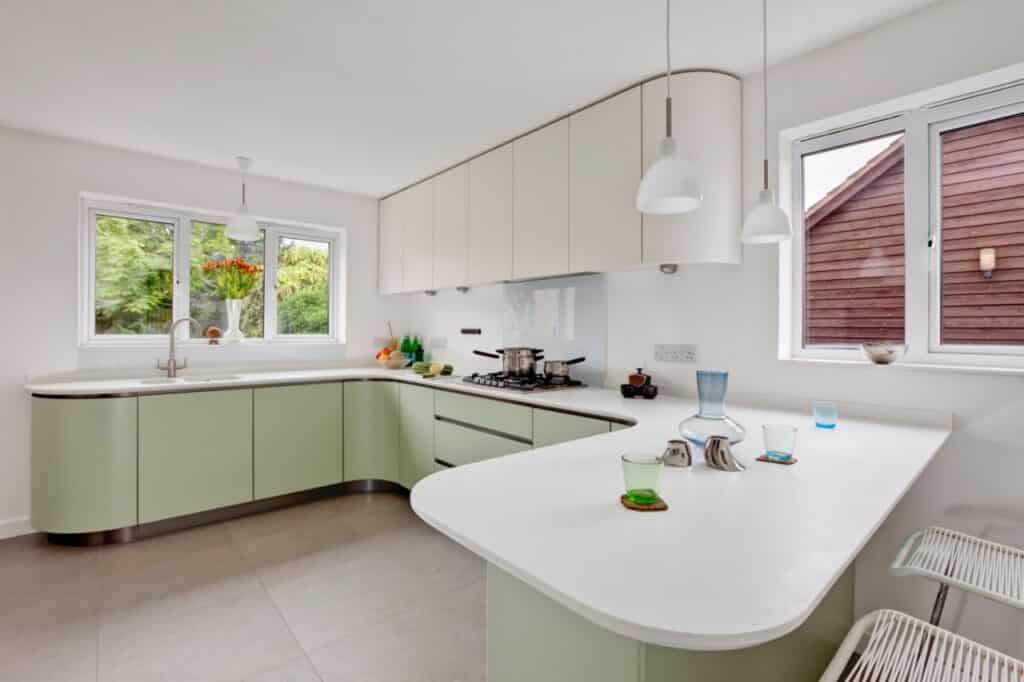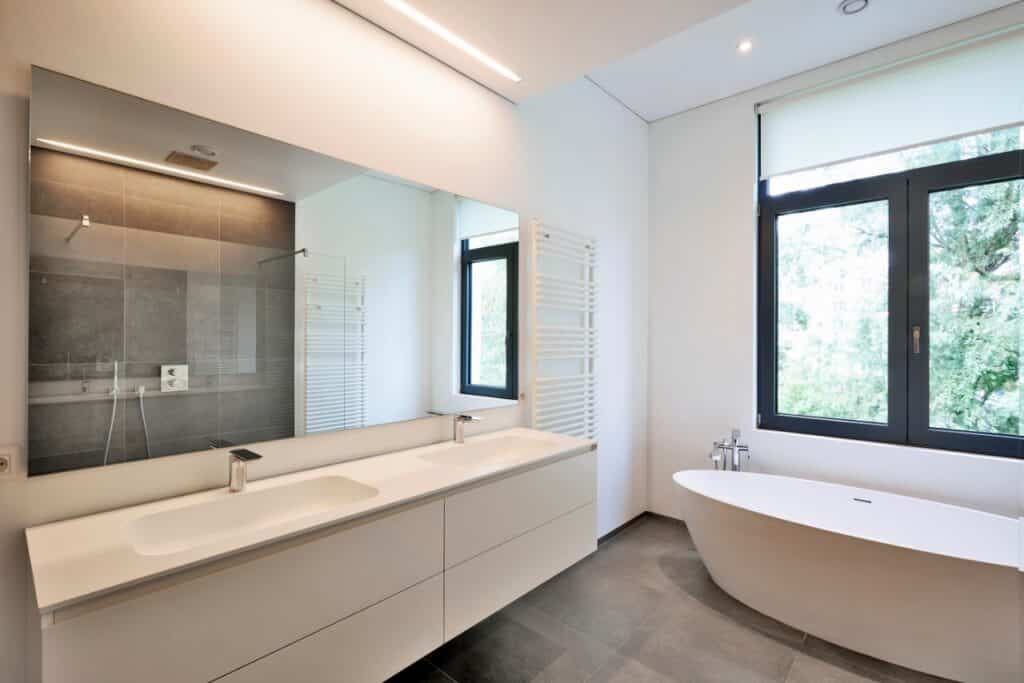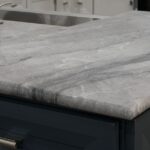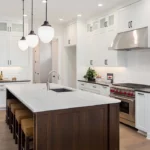When you’re remodeling your kitchen, choosing your next countertop might be a delight or a huge mess. You start searching and soon you realize there are more options than you can process at a time. And worse, sometimes you can’t even grasp the difference between one and the other. Such is commonly the case on the Corian vs quartz debate.
They are both man-made materials manufactured countertops made to somehow present a viable and solid alternative to stones. It’s easy to see why someone would mix them up. However, apart from that, their look, performance, and cost are quite different.
We will never stress enough that choosing the right countertop material is a careful job. It is all about picking something that matches your lifestyle and personality just as much as looks itself. So, in this article, we will help you understand which of these 2 options is your go-to. And we will examine all of their differences, pros, and cons.
Corian vs Quartz: Differences Explained
Before we get into the specifics, let’s have a quick overview of their differences and similarities.
Similarities:
- Both aren’t natural stone
- They require little to no maintenance
- Stain resistant
- Not very heat resistant
Differences
- Quartz looks more natural
- Corian is more customizable
- Quartz is more durable and damage-resistant
- Corian is slightly cheaper
Now, if you want a more in-depth look into those differences and similarities, we’ll explain them throughout the rest of the article. Be sure to check it out to find out which one would be the best option for you!
Solid Surface Countertops, AKA, Corian

Corian is actually a brand name associated with solid-surface countertops. It’s one of those cases where the product is only called by the name of the brand. Then the name gets associated with that type of product. With that being said, we will be reviewing here facts about all solid-surface countertops, not merely those branded Corian.
The material was first introduced in 1967 as an alternative to the then really popular plastic laminate countertops. Corian countertops soon got popular too, since they offered the obvious advantage of being solid. That is to say, that allows for the installation of undermount sinks and the creation of more elegant kitchens.
Solid-surface countertops are the result of a blend of natural minerals (~66%) and synthetic polymers (~33). Such mixture allowed for a cost-effective solid material that’s able to resemble the look of natural stone countertops. Especially the looks of granite, a trend that has lived for decades.
While Corian countertops got really popular in the 80s, they’ve been recently overshadowed by the popularization of quartz. Especially due to granite now being way cheaper.
Engineered Stone Countertops, AKA, Quartz

Placed on a more premium range of the price spectrum, comes quartz. Also a man-made material, but one that seeks to offer the benefits of natural stones without their few disadvantages. Make sure not to confuse it with quartzite, a natural stone, which is a completely different material.
Quartz, an engineered stone, and its process of fabrication was an invention of Marcelo Toncelli in the ’70s. His idea was patented and trademarked by his firm Breton. Over 50 companies worldwide are licensed to manufacture and sell quartz slabs of different designs. However, all of these products share the same traits of Breton’s patent.
Quartz countertops are manufactured by joining roughly 90-95% quartz crystals with polymers and pigments. The best quartz countertops are usually at least 93% pure ground quartz.
It’s exactly because the engineered stone is mainly formed from quartz crystals. As is a natural material with high hardness, it is able to perform similarly to actual stones. Which, by the way, are also composed of a lot of quartz.
As we’ve mentioned, many brands supply engineered stone and solid-surface countertops. As confusing as it may sound, Corian (the brand owned by DuPont) also offers a line of quartz countertops.
However, the traits of the materials supplied by all brands are very similar. Enough so, that we can make a proper comparative analysis of both materials, regardless of who fabricated them.
Appearance Differences between Corian and Quartz
Both Corian and quartz are manufactured in an extensive range of colors, patterns, and finishes. However, Corian, being the option that relies more on synthetic materials, will appear to be more artificial. However, that artificial look can also be an advantage, as you can find it in a wide range of colors and textures.
On the other end, quartz visuals are stunning and more realistic. Some quartz brands are able to mimic natural stones almost perfectly. Other exotic options offer unique takes on other materials, such as concrete, for instance.
When it comes to appearance quartz takes the best out of solid-surface countertops in almost all aspects except for one. Seams.
Similar to natural stones, quartz is fabricated and transported in slabs. And although you can find huge slabs of quartz for your project, that will make it really expensive. Plus there’s a limit to how large a slab can be. Large quartz projects will present seams.
Corian, on the other hand, can be molded in place and completely avoid seams, or hide them better.
Maintenance Differences
Both Corian and quartz countertops require little to no maintenance at all. We’re talking about day-to-day cleaning and that’s it.
That’s not to say they will both last the same, as we will see in our next section.
Durability Differences
Corian will not offer the same performance and durability as quartz.
Quartz is able to resist scratches, mold, and mildew. Corian will unfortunately be easily dented and scratched.
When it comes to heat resistance, both the materials can be damaged by hot pans. However, quartz can still endure it better.
Both materials are really stain-resistant, but they can be discolored by strong chemicals.
The one area where Corian actually performs better than quartz is outdoors. Corian can be installed outdoors, quartz can’t, or its colors will fade.
Usability Differences
When it comes to day-to-day usage quartz will take the top due to its higher durability.
You will be able to use quartz countertops without worrying much about scratches. And if you come to think about it knifes are handled over countertops every day.
Price Difference
At last, we will talk about this very important topic. Corian is cheaper than quartz, but not by much.
According to Home Advisor, Solid Surface Countertops will cost you from 52 to 120 dollars per square foot installed. The same website informs that quartz costs on average 125 dollars per square foot installed.
It’s worth noticing that although Corian countertops are cheaper, they require almost as much investment as granite countertops. Even though they cost 75 to 125 dollars per square foot according to the same website. It’s worth considering if that wouldn’t be a better investment, since granite is a top performer.
Read Also: Quartz vs Granite Countertops
Who wins the Corian vs Quartz comparison?
As we mentioned at the beginning of this article, it’s all about what fits your budget, tastes, and lifestyle better.
However, we can summarize by saying that quartz outperforms Corian in all areas, except for price and outdoor usage.
Are you shopping for countertops? If you live in Florida come visit us at Eagle Stones! We will be happy to provide free expert consultancy into choosing the best material for your applications.
FAQ
Corian is slightly cheaper than quartz. Top prices for Corian will reach $120 while quartz reaches $125.
Quartz is way more resistant. The only downside is that quartz cannot be used outside since the sunlight will affect its color.
Neither. Both are man-made engineered stones. That being said, both contain natural minerals in their composition. Quartz is 95% made out of natural quartz crystals, while Corian is made with a mix of 66% of several types of minerals.
Both are good choices for a kitchen. But be careful when working with hot pans near them. Heat can deform and stain the material, so always use protectors.



